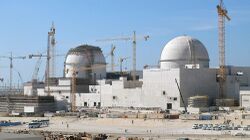Energy in Zhenia
Energy in Zhenia refers to Zhenia's situation in terms of production, consumption and trade of energy and electricity.
Although a considerable amount of Zhenia's electric demand is met by nuclear energy and renewable energy sources, a considerable portion of the total energy - including both electricity and vehicle fuel - remains to be supplied by fossil fuels, although latest trends have shown a sharp decline in coal usage and a steady increase in natural gas usage. Its energy supply is also one of the most nuclear-dependent systems in the world, with at least 56% of the nation's electricity production at any given time originating from nuclear energy.
As of 2019, while Zhenia remains to be the seventh-largest producer of petroleum, the ninth-largest producer of natural gas and home to around 12% of the world's coal reserves, Zhenia has ambitiously pushed its plan to ultimately substitute coal with less environmentally-impacting energy sources, with a considerable portion of the governmental effort going to nuclear power. While it can be, in theory, be self-sufficient in its fossil fuel demands, it relies on around 60% of its petroleum and natural gas on imports, in accordance to the National Resources Security Act that has been in effect since 1994.
Overview
History
Fossil Fuel
Petroleum
Natural Gas
Coal
Electricity Production
National Grid
Nuclear Power
Nuclear energy has become the single largest source of energy, following extensive investment in the research, development and implementation of nuclear reactors into the grid since the Third Republic. With over 200 reactors over 56 locations currently operating across the nation, as well as 7 more under construction or being planned, nuclear energy accounts for around 3,200Th terawatt-hours of electricity per year, or around 56.5% of the nation's total electric supply.

